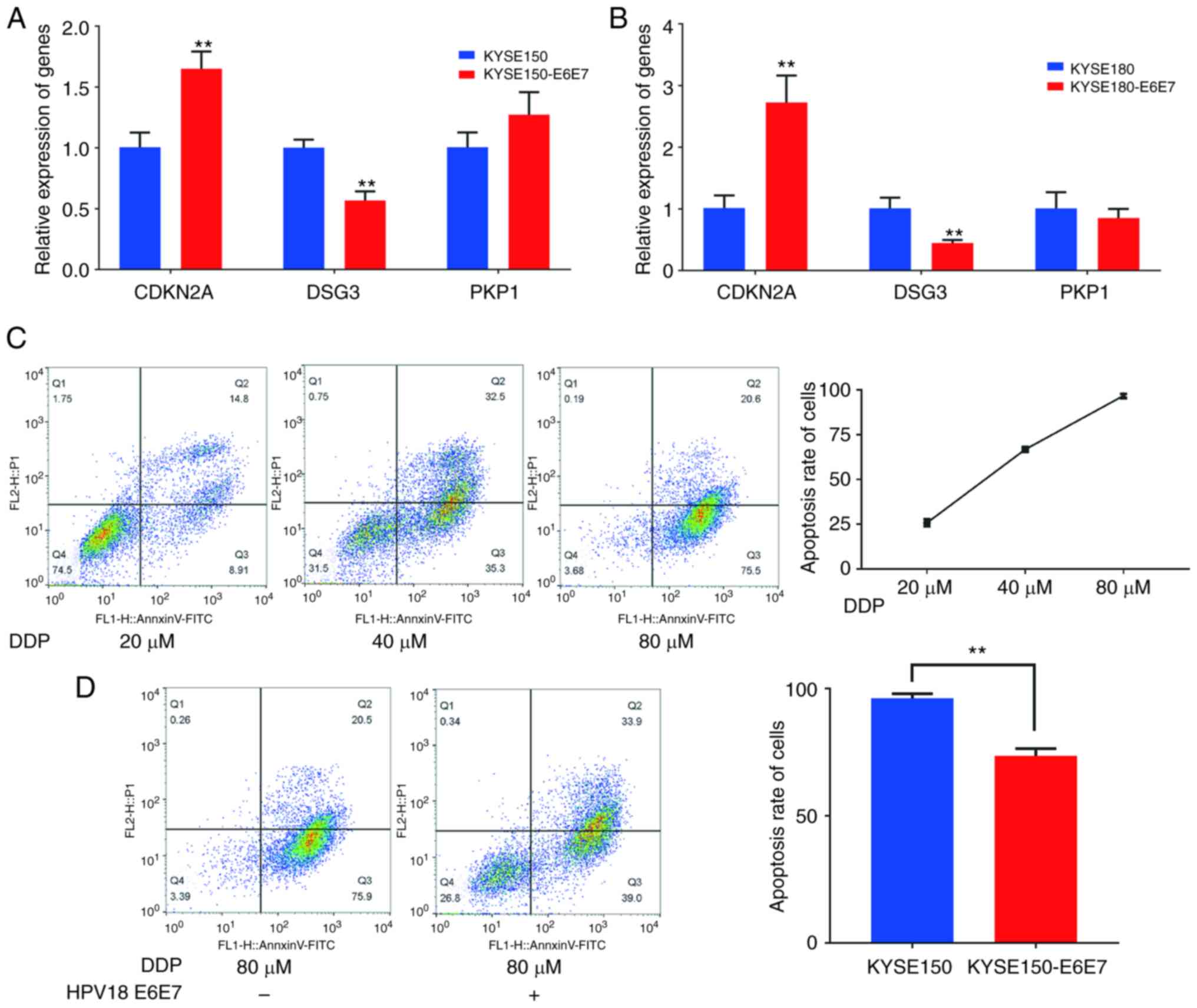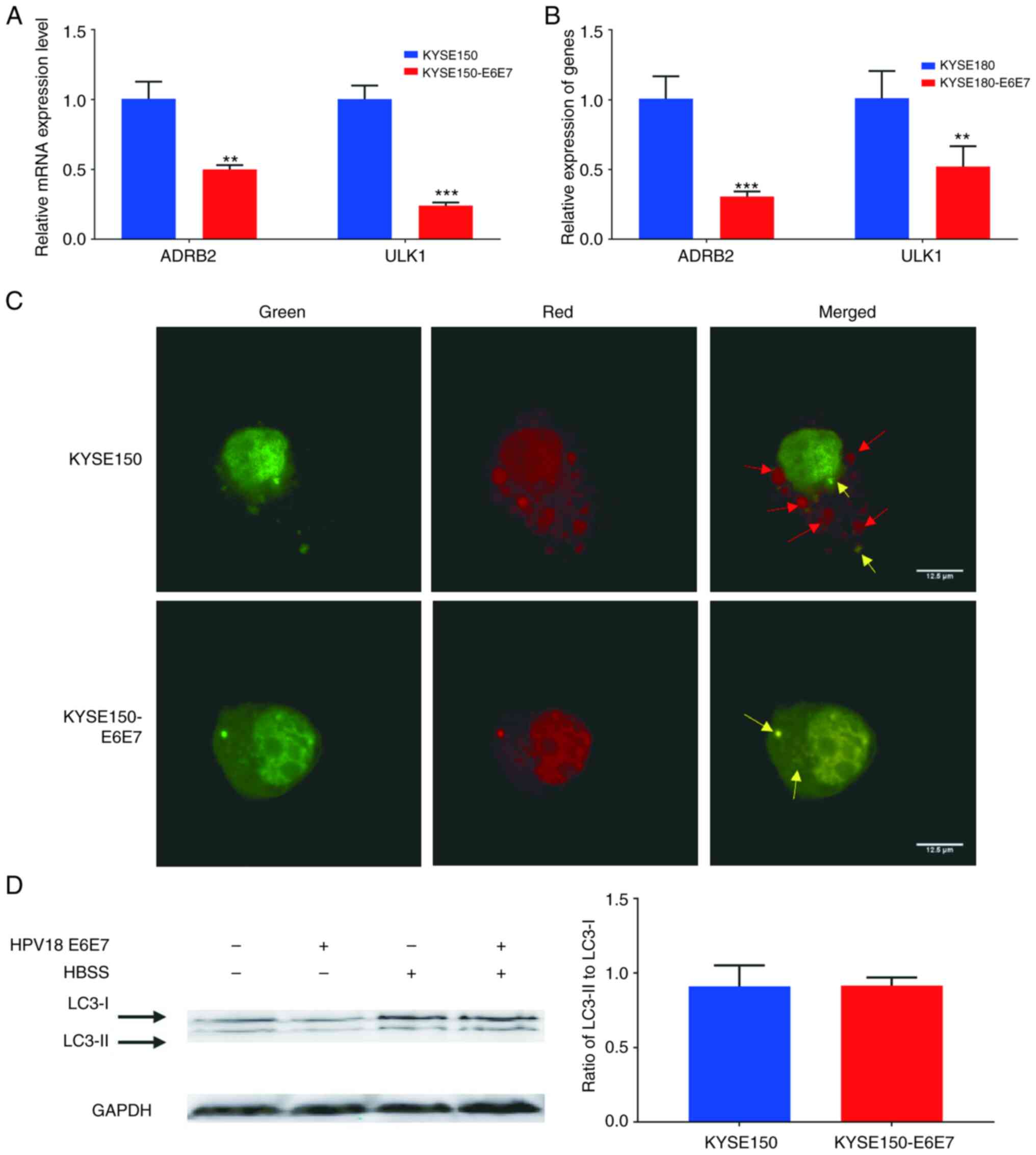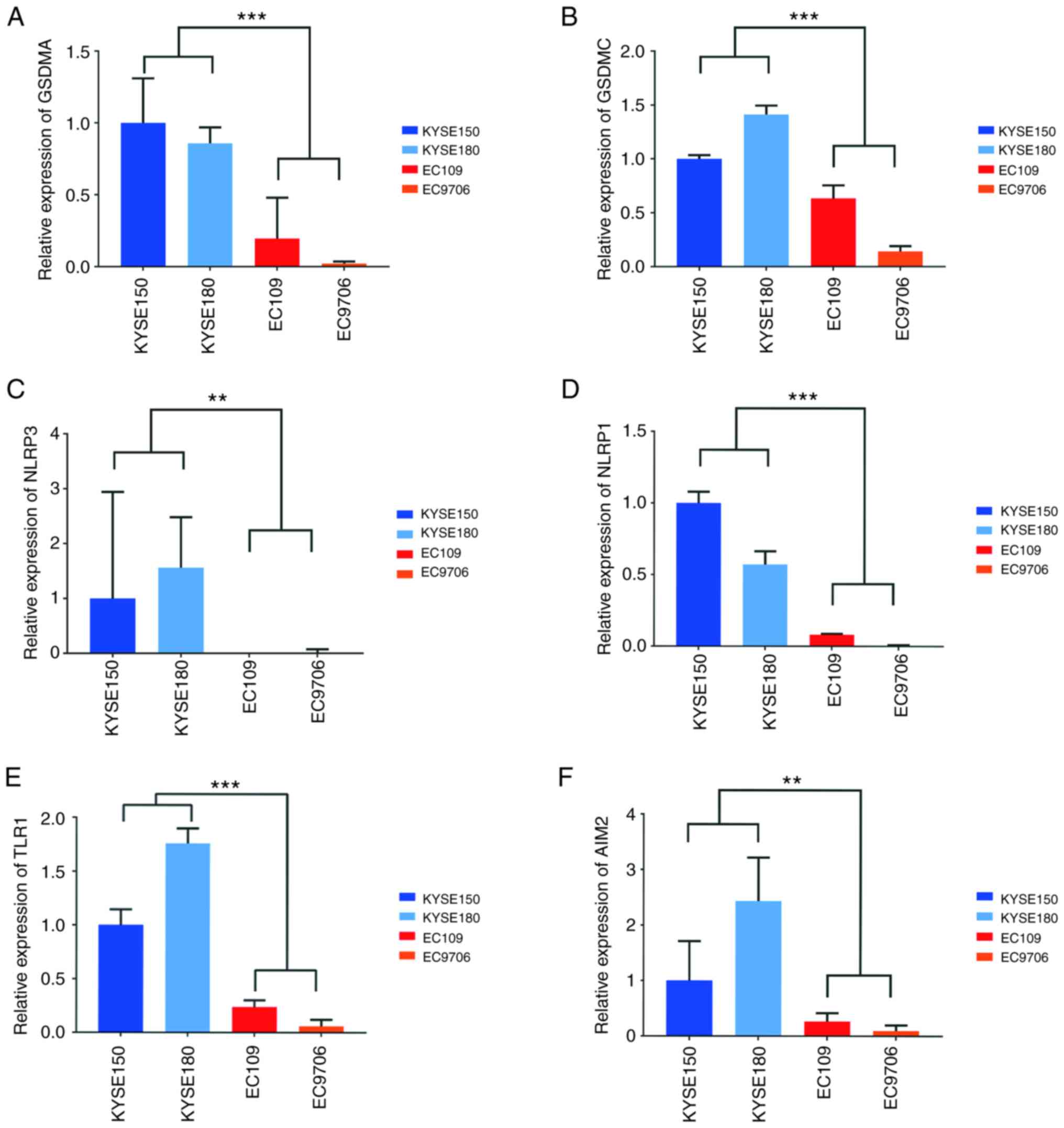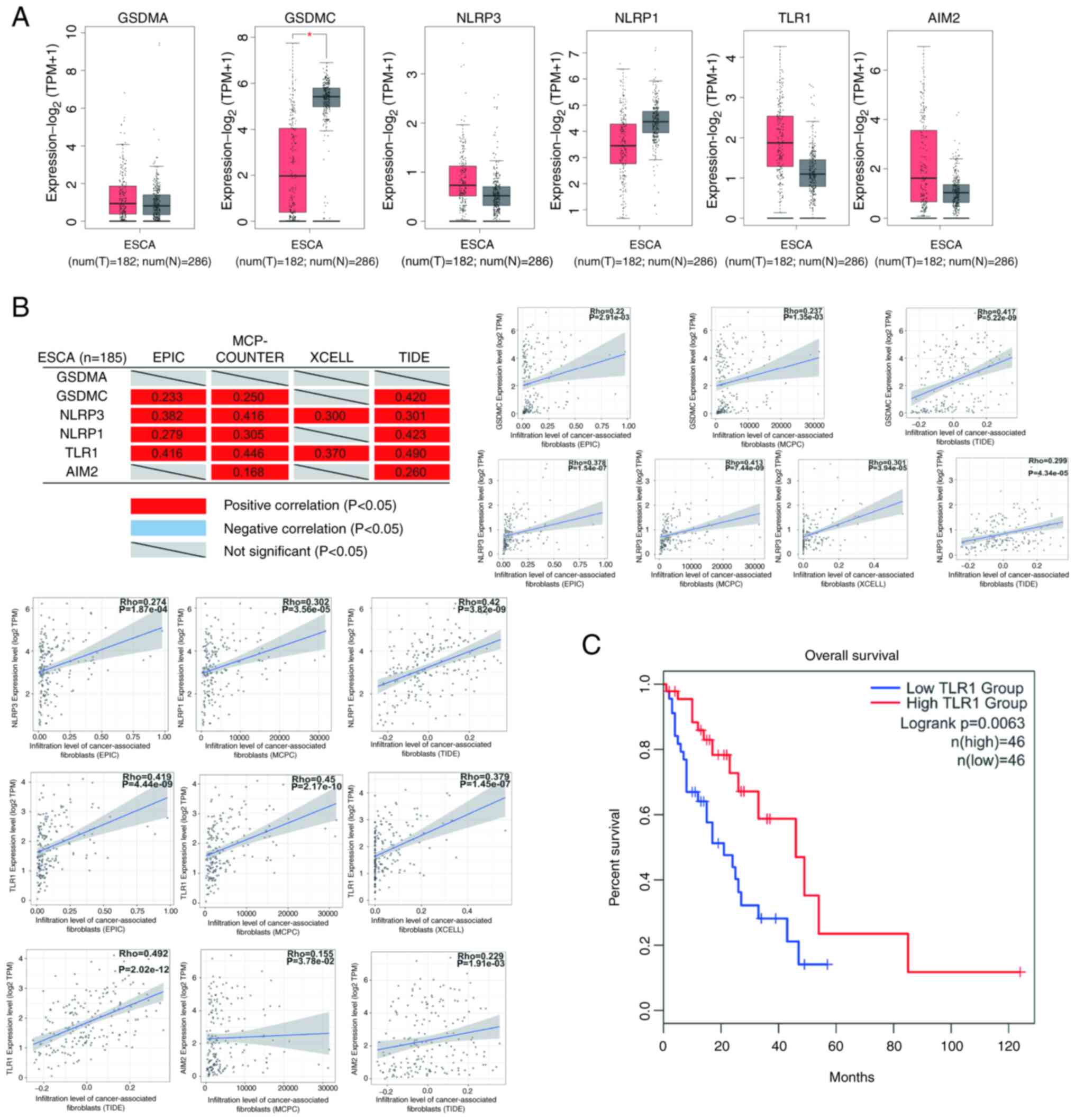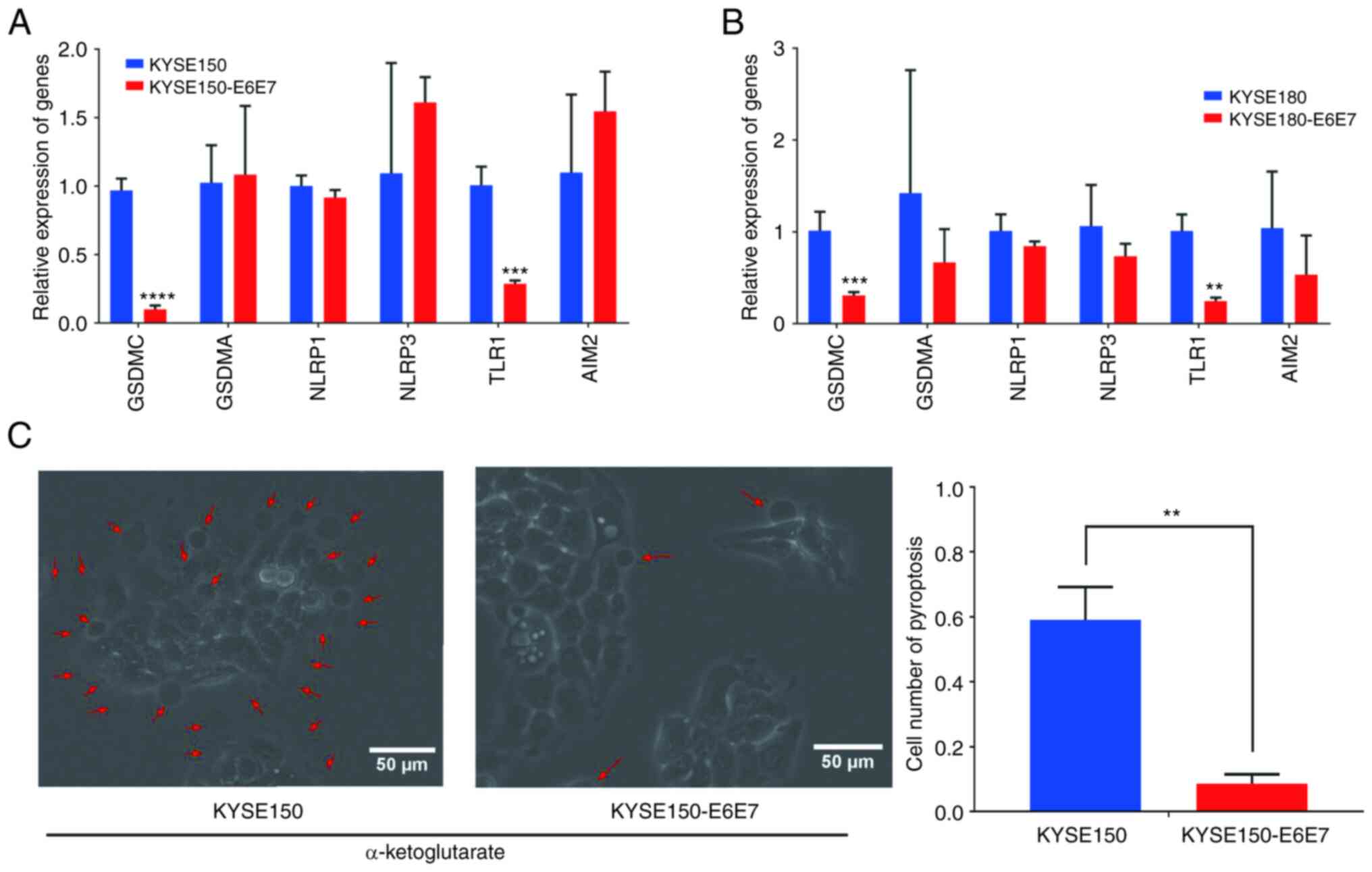|
1
|
Sung H, Ferlay J, Siegel RL, Laversanne M,
Soerjomataram I, Jemal A and Bray F: Global cancer statistics 2020:
GLOBOCAN estimates of incidence and mortality worldwide for 36
cancers in 185 countries. CA Cancer J Clin. 71:209–249. 2021.
View Article : Google Scholar : PubMed/NCBI
|
|
2
|
Short MW, Burgers KG and Fry VT:
Esophageal cancer. Am Fam Physician. 95:22–28. 2017.PubMed/NCBI
|
|
3
|
Uhlenhopp DJ, Then EO, Sunkara T and
Gaduputi V: Epidemiology of esophageal cancer: Update in global
trends, etiology and risk factors. Clin J Gastroenterol.
13:1010–1021. 2020. View Article : Google Scholar : PubMed/NCBI
|
|
4
|
Kikuchi H and Takeuchi H: Future
perspectives of surgery for esophageal cancer. Ann Thorac
Cardiovasc Surg. 24:219–222. 2018. View Article : Google Scholar : PubMed/NCBI
|
|
5
|
Serrano B, Brotons M, Bosch FX and Bruni
L: Epidemiology and burden of HPV-related disease. Best Pract Res
Clin Obstet Gynaecol. 47:14–26. 2018. View Article : Google Scholar : PubMed/NCBI
|
|
6
|
Castellsagué X: Natural history and
epidemiology of HPV infection and cervical cancer. Gynecol Oncol.
110 (3 Suppl 2):S4–S7. 2008. View Article : Google Scholar : PubMed/NCBI
|
|
7
|
de Martel C, Plummer M, Vignat J and
Franceschi S: Worldwide burden of cancer attributable to HPV by
site, country and HPV type. Int J Cancer. 141:664–670. 2017.
View Article : Google Scholar : PubMed/NCBI
|
|
8
|
Bognár L, Hegedűs I, Bellyei S, Pozsgai É,
Zoltán L, Gombos K, Horváth ÖP, Vereczkei A and Papp A: Prognostic
role of HPV infection in esophageal squamous cell carcinoma. Infect
Agent Cancer. 13:382018. View Article : Google Scholar : PubMed/NCBI
|
|
9
|
Dinc B, Altay-Kocak A, Aydog G, Kuran S,
Akoglu M, Ozkan S and Bozdayi G: Detection of HPV DNA in esophageal
lesions: A cross-sectional study. Clin Lab. 66:2020. View Article : Google Scholar
|
|
10
|
Shen Z, Cen S, Shen J, Cai W, Xu J, Teng
Z, Hu Z and Zeng Y: Study of immortalization and malignant
transformation of human embryonic esophageal epithelial cells
induced by HPV18 E6E7. J Cancer Res Clin Oncol. 126:589–594. 2000.
View Article : Google Scholar : PubMed/NCBI
|
|
11
|
Tang D, Wang B, Khodahemmati S, Li J, Zhou
Z, Gao J, Sheng W and Zeng Y: A transcriptomic analysis of
malignant transformation of human embryonic esophageal epithelial
cells by HPV18 E6E7. Transl Cancer Res. 9:1818–1832. 2020.
View Article : Google Scholar : PubMed/NCBI
|
|
12
|
Tang D, Kang R, Berghe TV, Vandenabeele P
and Kroemer G: The molecular machinery of regulated cell death.
Cell Res. 29:347–364. 2019. View Article : Google Scholar : PubMed/NCBI
|
|
13
|
Van Opdenbosch N and Lamkanfi M: Caspases
in cell death, inflammation, and disease. Immunity. 50:1352–1364.
2019. View Article : Google Scholar : PubMed/NCBI
|
|
14
|
Shankar S, Prasad D, Sanawar R, Das AV and
Pillai MR: TALEN based HPV-E7 editing triggers necrotic cell death
in cervical cancer cells. Sci Rep. 7:55002017. View Article : Google Scholar : PubMed/NCBI
|
|
15
|
Li TT, Zhao LN, Liu ZG, Han Y and Fan DM:
Regulation of apoptosis by the papillomavirus E6 oncogene. World J
Gastroenterol. 11:931–937. 2005. View Article : Google Scholar : PubMed/NCBI
|
|
16
|
Wawryk-Gawda E, Chylińska-Wrzos P,
Lis-Sochocka M, Chłapek K, Bulak K, Jędrych M and Jodłowska-Jędrych
B: P53 protein in proliferation, repair and apoptosis of cells.
Protoplasma. 251:525–533. 2014. View Article : Google Scholar : PubMed/NCBI
|
|
17
|
Mattoscio D, Medda A and Chiocca S: Human
papilloma virus and autophagy. Int J Mol Sci. 19:17752018.
View Article : Google Scholar : PubMed/NCBI
|
|
18
|
Song Y, Wu X, Xu Y, Zhu J, Li J, Zou Z,
Chen L, Zhang B, Hua C, Rui H, et al: HPV E7 inhibits cell
pyroptosis by promoting TRIM21-mediated degradation and
ubiquitination of the IFI16 inflammasome. Int J Biol Sci.
16:2924–2937. 2020. View Article : Google Scholar : PubMed/NCBI
|
|
19
|
Boon SS, Chen Z, Li J, Lee KYC, Cai L,
Zhong R and Chan PKS: Human papillomavirus type 18 oncoproteins
exert their oncogenicity in esophageal and tongue squamous cell
carcinoma cell lines distinctly. BMC Cancer. 19:12112019.
View Article : Google Scholar : PubMed/NCBI
|
|
20
|
Shimada Y, Imamura M, Wagata T, Yamaguchi
N and Tobe T: Characterization of 21 newly established esophageal
cancer cell lines. Cancer. 69:277–284. 1992. View Article : Google Scholar : PubMed/NCBI
|
|
21
|
Livak KJ and Schmittgen TD: Analysis of
relative gene expression data using real-time quantitative PCR and
the 2(−Delta Delta C(T)) method. Methods. 25:402–408. 2001.
View Article : Google Scholar : PubMed/NCBI
|
|
22
|
Wang X, Martindale JL and Holbrook NJ:
Requirement for ERK activation in cisplatin-induced apoptosis. J
Biol Chem. 275:39435–39443. 2000. View Article : Google Scholar : PubMed/NCBI
|
|
23
|
Zhang JY, Zhou B, Sun RY, Ai YL, Cheng K,
Li FN, Wang BR, Liu FJ, Jiang ZH, Wang WJ, et al: The metabolite
α-KG induces GSDMC-dependent pyroptosis through death receptor
6-activated caspase-8. Cell Res. 31:980–997. 2021. View Article : Google Scholar : PubMed/NCBI
|
|
24
|
Chen C, Chen H, Zhang Y, Thomas HR, Frank
MH, He Y and Xia R: TBtools: An integrative toolkit developed for
interactive analyses of big biological data. Mol Plant.
13:1194–1202. 2020. View Article : Google Scholar : PubMed/NCBI
|
|
25
|
Zhao Y, Yang J, Liu Y, Fan J and Yang H:
HSV-2-encoded miRNA-H4 regulates cell cycle progression and
Act-D-induced Apoptosis in HeLa cells by targeting CDKL2 and
CDKN2A. Virol Sin. 34:278–286. 2019. View Article : Google Scholar : PubMed/NCBI
|
|
26
|
Li X, Ahmad US, Huang Y, Uttagomol J,
Rehman A, Zhou K, Warnes G, McArthur S, Parkinson EK and Wan H:
Desmoglein-3 acts as a pro-survival protein by suppressing reactive
oxygen species and doming whilst augmenting the tight junctions in
MDCK cells. Mech Ageing Dev. 184:1111742019. View Article : Google Scholar : PubMed/NCBI
|
|
27
|
Haase D, Cui T, Yang L, Ma Y, Liu H, Theis
B, Petersen I and Chen Y: Plakophilin 1 is methylated and has a
tumor suppressive activity in human lung cancer. Exp Mol Pathol.
108:73–79. 2019. View Article : Google Scholar : PubMed/NCBI
|
|
28
|
Yi SA, Lee DH, Kim GW, Ryu HW, Park JW,
Lee J, Han J, Park JH, Oh H, Lee J, et al: HPV-mediated nuclear
export of HP1γ drives cervical tumorigenesis by downregulation of
p53. Cell Death Differ. 27:2537–2551. 2020. View Article : Google Scholar : PubMed/NCBI
|
|
29
|
Kim J, Kundu M, Viollet B and Guan KL:
AMPK and mTOR regulate autophagy through direct phosphorylation of
Ulk1. Nat Cell Biol. 13:132–141. 2011. View Article : Google Scholar : PubMed/NCBI
|
|
30
|
Chen G, Jin X, Luo D, Ai J, Xiao K, Lai J,
He Q, Li H and Wang K: β-Adrenoceptor regulates contraction and
inflammatory cytokine expression of human bladder smooth muscle
cells via autophagy under pathological hydrostatic pressure.
Neurourol Urodyn. 39:2128–2138. 2020. View Article : Google Scholar : PubMed/NCBI
|
|
31
|
Li K, Deng Y, Deng G, Chen P, Wang Y, Wu
H, Ji Z, Yao Z, Zhang X, Yu B and Zhang K: High cholesterol induces
apoptosis and autophagy through the ROS-activated AKT/FOXO1 pathway
in tendon-derived stem cells. Stem Cell Res Ther. 11:1312020.
View Article : Google Scholar : PubMed/NCBI
|
|
32
|
Zhang G, He C, Wu Q, Xu G, Kuang M, Wang
T, Xu L, Zhou H and Yuan W: Impaired autophagy induced by
oxLDL/β2GPI/anti-β2GPI complex through PI3K/AKT/mTOR and eNOS
signaling pathways contributes to endothelial cell dysfunction.
Oxid Med Cell Longev. 2021:66622252021.PubMed/NCBI
|
|
33
|
Deng W, Bai Y, Deng F, Pan Y, Mei S, Zheng
Z, Min R, Wu Z, Li W, Miao R, et al: Streptococcal pyrogenic
exotoxin B cleaves GSDMA and triggers pyroptosis. Nature.
602:496–502. 2022. View Article : Google Scholar : PubMed/NCBI
|
|
34
|
Qiu Z, He Y, Ming H, Lei S, Leng Y and Xia
ZY: Lipopolysaccharide (LPS) aggravates high glucose- and
hypoxia/reoxygenation-induced injury through activating
ROS-dependent NLRP3 inflammasome-mediated pyroptosis in H9C2
cardiomyocytes. J Diabetes Res. 2019:81518362019. View Article : Google Scholar : PubMed/NCBI
|
|
35
|
Sun L, Ma W, Gao W, Xing Y, Chen L, Xia Z,
Zhang Z and Dai Z: Propofol directly induces caspase-1-dependent
macrophage pyroptosis through the NLRP3-ASC inflammasome. Cell
Death Dis. 10:5422019. View Article : Google Scholar : PubMed/NCBI
|
|
36
|
Xu Y, Chen Y, Niu Z, Xing J, Yang Z, Yin
X, Guo L, Zhang Q, Qiu H and Han Y: A novel pyroptotic and
inflammatory gene signature predicts the prognosis of cutaneous
melanoma and the effect of anticancer therapies. Front Med
(Lausanne). 9:8415682022. View Article : Google Scholar : PubMed/NCBI
|
|
37
|
Li H, Li Y, Song C, Hu Y, Dai M, Liu B and
Pan P: Neutrophil extracellular traps augmented alveolar macrophage
pyroptosis via AIM2 inflammasome activation in LPS-induced
ALI/ARDS. J Inflamm Res. 14:4839–4858. 2021. View Article : Google Scholar : PubMed/NCBI
|
|
38
|
Harada K, Rogers JE, Iwatsuki M, Yamashita
K, Baba H and Ajani JA: Recent advances in treating oesophageal
cancer. F1000Res 9: F1000 Faculty Rev. 11892020. View Article : Google Scholar
|
|
39
|
Serra S and Chetty R: p16. J Clin Pathol.
71:853–858. 2018. View Article : Google Scholar : PubMed/NCBI
|
|
40
|
Ishida H, Kasajima A, Fujishima F, Akaishi
R, Ueki S, Yamazaki Y, Onodera Y, Gao X, Okamoto H, Taniyama Y, et
al: p16 in highly malignant esophageal carcinomas: The correlation
with clinicopathological factors and human papillomavirus
infection. Virchows Arch. 478:219–229. 2021. View Article : Google Scholar : PubMed/NCBI
|
|
41
|
Szymonowicz KA and Chen J: Biological and
clinical aspects of HPV-related cancers. Cancer Biol Med.
17:864–878. 2020. View Article : Google Scholar : PubMed/NCBI
|
|
42
|
Yang C, Fischer-Kešo R, Schlechter T,
Ströbel P, Marx A and Hofmann I: Plakophilin 1-deficient cells
upregulate SPOCK1: Implications for prostate cancer progression.
Tumour Biol. 36:9567–9577. 2015. View Article : Google Scholar : PubMed/NCBI
|
|
43
|
Wang B, Tang D, Liu Z, Wang Q, Xue S, Zhao
Z, Feng D, Sheng C, Li J and Zhou Z: LINC00958 promotes
proliferation, migration, invasion, and epithelial-mesenchymal
transition of oesophageal squamous cell carcinoma cells. PLoS One.
16:e02517972021. View Article : Google Scholar : PubMed/NCBI
|
|
44
|
Alaibac M: Targeting DSG3: From pemphigus
to squamous cell carcinoma. Expert Opin Ther Targets. 17:477–479.
2013. View Article : Google Scholar : PubMed/NCBI
|
|
45
|
Chen YJ, Lee LY, Chao YK, Chang JT, Lu YC,
Li HF, Chiu CC, Li YC, Li YL, Chiou JF and Cheng AJ: DSG3
facilitates cancer cell growth and invasion through the
DSG3-plakoglobin-TCF/LEF-Myc/cyclin D1/MMP signaling pathway. PLoS
One. 8:e640882013. View Article : Google Scholar : PubMed/NCBI
|
|
46
|
Lin MG and Hurley JH: Structure and
function of the ULK1 complex in autophagy. Curr Opin Cell Biol.
39:61–68. 2016. View Article : Google Scholar : PubMed/NCBI
|
|
47
|
Wu FQ, Fang T, Yu LX, Lv GS, Lv HW, Liang
D, Li T, Wang CZ, Tan YX, Ding J, et al: ADRB2 signaling promotes
HCC progression and sorafenib resistance by inhibiting autophagic
degradation of HIF1α. J Hepatol. 65:314–324. 2016. View Article : Google Scholar : PubMed/NCBI
|
|
48
|
Hou J, Zhao R, Xia W, Chang CW, You Y, Hsu
JM, Nie L, Chen Y, Wang YC, Liu C, et al: PD-L1-mediated gasdermin
C expression switches apoptosis to pyroptosis in cancer cells and
facilitates tumour necrosis. Nat Cell Biol. 22:1264–1275. 2020.
View Article : Google Scholar : PubMed/NCBI
|
|
49
|
Jiao Y, Wang L, Lu L, Liu J, Li X, Zhao H,
Hou Z and Zheng B: The role of caspase-4 and NLRP1 in MCF7 cell
pyroptosis induced by hUCMSC-secreted factors. Stem Cells Int.
2020:88671152020. View Article : Google Scholar : PubMed/NCBI
|
|
50
|
Rathinam VAK, Zhao Y and Shao F: Innate
immunity to intracellular LPS. Nat Immunol. 20:527–533. 2019.
View Article : Google Scholar : PubMed/NCBI
|
|
51
|
Wang SH, Cui LG, Su XL, Komal S, Ni RC,
Zang MX, Zhang LR and Han SN: GSK-3β-mediated activation of NLRP3
inflammasome leads to pyroptosis and apoptosis of rat
cardiomyocytes and fibroblasts. Eur J Pharmacol. 920:1748302022.
View Article : Google Scholar : PubMed/NCBI
|
|
52
|
Heidegger I, Borena W and Pichler R: The
role of human papilloma virus in urological malignancies.
Anticancer Res. 35:2513–2519. 2015.PubMed/NCBI
|
|
53
|
Badarni M, Prasad M, Balaban N, Zorea J,
Yegodayev KM, Joshua BZ, Dinur AB, Grénman R, Rotblat B, Cohen L
and Elkabets M: Repression of AXL expression by AP-1/JNK blockage
overcomes resistance to PI3Ka therapy. JCI Insight. 5:e1253412019.
View Article : Google Scholar : PubMed/NCBI
|
|
54
|
Liu CY, Li F, Zeng Y, Tang MZ, Huang Y, Li
JT and Zhong RG: Infection and integration of high-risk human
papillomavirus in HPV-associated cancer cells. Med Oncol.
32:1092015. View Article : Google Scholar : PubMed/NCBI
|
|
55
|
Liao X, Gao Y, Liu J, Tao L, Xie J, Gu Y,
Liu T, Wang D, Xie D and Mo S: Combination of tanshinone IIA and
cisplatin inhibits esophageal cancer by downregulating
NF-κB/COX-2/VEGF pathway. Front Oncol. 10:17562020. View Article : Google Scholar : PubMed/NCBI
|
|
56
|
Mattoscio D, Casadio C, Miccolo C, Maffini
F, Raimondi A, Tacchetti C, Gheit T, Tagliabue M, Galimberti VE, De
Lorenzi F, et al: Autophagy regulates UBC9 levels during
viral-mediated tumorigenesis. PLoS Pathog. 13:e10062622017.
View Article : Google Scholar : PubMed/NCBI
|



















